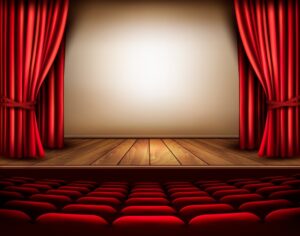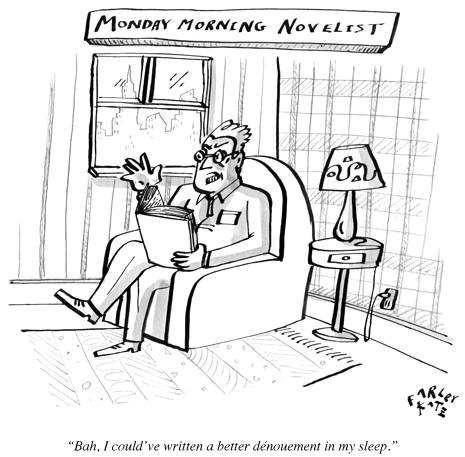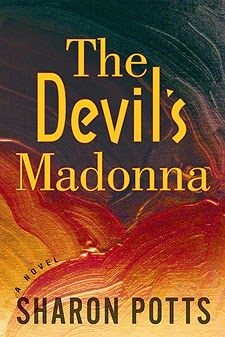
Today we dive into the TKZ archives for some wisdom from the silver screen. P.J. Parrish gives us lessons for writers from several movies, Joe Hartlaub discusses two flicks available on Netflix at the time of his post, and James Scott Bell dives into the film The King’s Speech.
All three posts are well worth reading in their entirety, and are date-linked from the bottom of their respective excerpts.

As Good As It Gets: Write what you know
When the poor secretary asks romance writer Jack Nicholson how we writes such great women, he delivers one of the greatest comebacks in all of moviedom (above clip). The lesson here is that yes, the chestnut “write what you know” is useful but only to a point. A fiction writer MUST be able to write outside her gender, race and limited world. But unless you have deep empathy and acute powers of observation, and, maybe most important, the ability to take a specific experience (especially if it’s your own) and make it universal so it connects with Everyman, you won’t succeed. I am not sure this can be learned. It might just be the special province of talent.
Adaptation: Know when to quit
Not quit writing. Just what you are writing. “Adaptation” speaks to all of us writers on many levels, but its most gut-wrenching lesson is about the despair of trying to be passionate about a book you don’t really care about. I’ve had to make the hard choice to abandon a book in midstream. But I’ll let my friend Sharon Potts tell you about this valuable lesson:
“For the past year, I’ve been struggling with a book that frequently feels like more than I can handle. Too many subplots that are all tangled up and I can’t seem to bring them to a satisfying resolution. And then I realized, my problem is more than plotting. It’s my protagonist. I don’t ‘feel’ her anymore. I don’t care if she saves herself and the world. So how can I write if I’m not passionate? And if I don’t feel it, will readers care when I finally finish the book? In the meantime, another story has been poking at me. A story that ties to my mother’s past and to historical events I’ve always cared about. Even before I write a word, I can already see my protagonist clearly. She’s so real to me that she overpowers the heroine in the book I’ve been struggling to finish. So I made a decision. After a full year and over 100,000 words, I’m putting aside my ‘frustration’ novel. I’m going to write the story my heart wants to tell.”
Deconstructing Harry: Know when to keep going
This is not my favorite Woody Allen movie; it’s a vulgar uneven portrait of a self-serving user who turns everyone in his life into fictional fodder. (Sorry, can’t get this video link to work!) One character tells him, “This little sewer of an apartment is where you take everyone’s suffering and turn it into gold.” Tough to watch. But I like the ending because it strikes the only note of light when Harry Block realizes “his writing, in more ways than one, had saved his life.”
Not a bad lesson, all in all. What are your favorite writer movies and what did you learn from them?
P.J. Parrish—July 23, 2013
If you’re going to watch Netflix but you want to justify paying the time bandit instead of following your Muse you can actually learn quite a bit by judiciously choosing what you watch. I’m going to briefly discuss a couple of movies that you can find in Netflix’ nether regions that you either may not have heard of or which flitted across your attention due to not being your type of movie. I’ll also mention another that just hit theaters (remember theaters? Those big cavernous places that you stopped going to because half of the audience thinks they’re on Facebook, and can yell out everything they want?) yesterday. Without further ado:
— Train to Busan: I quit watching Walking Dead when Rick’s son lost his eye and then pretty much gave up on the zombie horror sub-genre altogether. Someone recommended Train to Busan on Netflix as a zombie movie for people who were tired of zombies or hated the genre. My friend was right. Train to Busan, a South Korean horror film, hooks you in the first three minutes, giving you a hint of what is to come, stepping back and featuring a bit of human drama, and then putting you on the edge of your seat for an hour and a half or so. The set up is that an overworked hedge fund broker takes the morning off to accompany his young daughter (who is the cutest little kid who ever walked the face of the earth) on a high-speed train to visit her mother. The zombie apocalypse breaks out on the train and off we go. These zombies, by the way, aren’t the usual shambling dodos that can be taken out with a well-placed arrow. They are fleet of foot (they can somehow stumble and run like hell at the same time) and extremely aggressive. My favorite line of the film occurs when a passenger gets on the train intercom and says, “Conductor, we have a situation!” No kidding, Sherlock. The film itself features an excellent example of how to hint at a problem at the beginning of a work, let the problem percolate off-screen (or off the page), and then bring it back with a vengeance. It also is a reminder that light rail, buses, trains, boats, or planes are to be avoided at all costs.
Hell or High Water: This contemporary western finally made it to Netflix and will cause you to trade in your bird box or whatever. A man gets out of prison to find that the family farm has gone into foreclosure during his absence. He and his brother embark on a scheme to rob the branches of the regional bank which holds the mortgage and then use the money to pay off the loan on the farm. It could have been a comedy — and yes, as an exercise you could rewrite it as a comedy — but it isn’t. Things don’t go exactly as planned and the brothers soon find that law enforcement is after them. Jeff Bridges, in what might be the performance of his life, plays a Texas Ranger who is just weeks away from retirement. His investigation into the robberies will certainly be his last case and he wants to retire on top by identifying the robbers and bringing them in dead or alive. There is plenty of moral ambiguity to be had all around, a few quirky characters, and an ending you won’t see coming. There’s a bit of action and plenty of drama, all of it perfectly placed and paced, but you will want to take notes on the dialogue, which is first class from beginning to end and which is just as important for what is not said as for what is.
Joe Hartlaub—January 26, 2019
The King’s Speech (2010) won Oscars for Best Picture, Actor, Director, and Screenwriter. How did they pull that off?
Through the power of character bonding and the magic of story structure. You can do just about anything with your novel so long as you have a reader intensely and emotionally invested in your Lead and put him through the beats of a well-crafted tale.
Let’s talk about emotional investment first. In Plot & Structure I discuss various ways a writer can join reader and character in the bonds of holy storytelling. One of the strongest bonding agents is hardship—at the beginning we are introduced to a character who faces a physical or emotional challenge.
In The King’s Speech, the hardship is both physical and psychological. Prince Albert, the Duke of York (Colin Firth) has a severe stammer which not only prevents him from delivering a simple speech; it also keeps him locked in a prison of self-doubt.
As the movie opens we see Albert nervously stepping up to a microphone to speak to a crowd. His stuttering talk bombs. People look embarrassed and disappointed. Prince Albert’s hardship has caused him massive public humiliation.
We’ve all been embarrassed, though not on so grand a scale. So we have immediate sympathy.
But that’s not all. There’s another powerful bonding agent I call the Care Package. This is a relationship in place before the story begins, showing that the Lead is not merely self interested. If we see someone who cares about someone else, it gives us hope for his ultimate redemption.
Early in Act 1 there is a lovely scene that gets me every time. Prince Albert, all done up in a tux, comes to say good-night to his two daughters. They want a story! “Can’t I be a penguin instead?” he asks. Clearly, he doubts even his ability to tell his children a simple bedtime tale. But they insist!
And so, out of love and fatherly duty, he makes the attempt. He tells a story about two princesses whose papa was changed by a witch into a penguin. This made him sad, for a penguin does not have arms to embrace his children. Not only that, the witch banished him to the South Pole. It’s obvious he is talking, metaphorically, about himself. The story ends with a restored father hugging his daughters. We can’t help but wonder if Albert will be healed, too. By now we hope so, because we are firmly invested in him.
The Duchess (Helena Bonham Carter) arranges a meeting for Albert with an eccentric speech therapist named Lionel Logue (Geoffrey Rush). Here we get another structural beat: The Argument Against Transformation. Unconvinced Lionel can help him, Albert is about to leave when Lionel asks him to try something. He puts headphones on the prince and plays classical music while having the prince read the famous soliloquy from Hamlet. After a minute or so Albert rips off the headphones and shouts, “Hopeless!” Then: “Thank you, Doctor. I don’t…feel this is for me.”
This sets up the arc of transformation that pays off at the end. (In Casablanca, Rick argues against his ultimate transformation by saying, “I stick my neck out for nobody.” At the end, of course, he does that very thing.)
James Scott Bell—December 1, 2019
***
There you have it, wisdom from the movies.
- Do you have a favorite movie about writing and writers? What lessons does that movie give us?
- In the spirit of Joe’s post, is there a movie, good or bad, on the streaming service of your choice (including the library) that has “goosed your muse” and given you food for creative thought?
- What favorite movie of yours invests the reader emotionally right off the bat, like The King’s Speech? Do you have a cinematic favorite argument against transformation?





